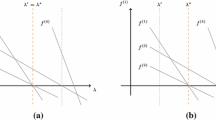Abstract
In the late seventies, Megiddo proposed a way to use an algorithm for the problem of minimizing a linear function a 0 + a 1 x 1 + . . . + a n x n subject to certain constraints to solve the problem of minimizing a rational function of the form (a 0 + a 1 x 1 + . . . + a n x n )/(b 0 + b 1 x 1 + . . . + b n x n ) subject to the same set of constraints, assuming that the denominator is always positive. Using a rather strong assumption, Hashizume et al. extended Megiddo’s result to include approximation algorithms. Their assumption essentially asks for the existence of good approximation algorithms for optimization problems with possibly negative coefficients in the (linear) objective function, which is rather unusual for most combinatorial problems. In this paper, we present an alternative extension of Megiddo’s result for approximations that avoids this issue and applies to a large class of optimization problems. Specifically, we show that, if there is an α-approximation for the problem of minimizing a nonnegative linear function subject to constraints satisfying a certain increasing property then there is an α-approximation (1/α-approximation) for the problem of minimizing (maximizing) a nonnegative rational function subject to the same constraints. Our framework applies to covering problems and network design problems, among others.
Similar content being viewed by others
References
Billionnet A.: Approximation algorithms for fractional knapsack problems. Oper. Res. Lett. 30(5), 336–342 (2002)
Bitran G.R., Magnanti T.L.: Duality and sensitivity analysis for fractional programs. Oper. Res. 24, 675–699 (1976)
Carlson, J., Eppstein, D.: The weighted maximum-mean subtree and other bicriterion subtree problems. In: ACM Computing Research Repository, cs.CG/0503023. (2005)
Chen D.Z., Daescu O., Dai Y., Katoh N., Wu X., Xu J.: Efficient algorithms and implementations for optimizing the sum of linear fractional functions, with applications. J. Comb. Optim. 9, 69–90 (2005)
Dantzig G.B., Blattner W., Rao M.R.: Finding a cycle in a graph with minimum cost to time ratio with applications to a ship routing problem. In: Rosensthiel, P. (eds) Theory of Graphs: International Symposium, pp. 77–84. Dunod, Paris (1967)
Dasdan A., Gupta R.K.: Faster maximum and minimum mean cycle algorithms for system-performance analysis. IEEE Trans. Comp. Aid. Des. Integr. Circ. Syst. 17(10), 889–899 (1998)
Dasdan, A., Irani, S.S., Gupta, R.K.: Efficient algorithms for optimum cycle mean and optimum cost to time ratio problems. In: Proceedings of the 36th ACM/IEEE Conference on Design Automation, pp. 37–42 (1999)
Dinkelbach W.: On nonlinear fractional programming. Manag. Sci. 13, 492–498 (1967)
Garey M.R., Johnson D.S.: Computers and Intractability: A Guide to the Theory of NP—Completeness. W.H. Freeman and Co., New York (1979)
Gubbala, P., Raghavachari, B.: Finding k—connected subgraphs with minimum average weight. In: Proceedings of the 6th Latin American Theoretical Informatics Symposium (LATIN), Lecture Notes in Computer Science, vol. 2976, pp. 212–221. Springer, Berlin (2004)
Hashizume S., Fukushima M., Katoh N., Ibaraki T.: Approximation algorithms for combinatorial fractional programming problems. Math. Program. 37, 255–267 (1987)
Jagannathan R.: On some properties of programming problems in parametric form pertaining to fractional programming. Manag. Sci. 12, 609–615 (1966)
Jain K.: A factor 2 approximation algorithm for the generalized Steiner network problem. Combinatorica 21(1), 39–60 (2001)
Jain K., Măndoiu I., Vazirani V.V., Williamson D.P.: A primal-dual schema based approximation algorithm for the element connectivity problem. J. Algorithms 45(1), 1–15 (2002)
Karp R.M.: A characterization of the minimum cycle mean in a digraph. Discrete Math. 23(3), 309–311 (1978)
Katoh N.: A fully polynomial-time approximation scheme for minimum cost-reliability ratio problems. Discrete Appl. Math. 35(2), 143–155 (1992)
Khuller S., Vishkin U.: Biconnectivity approximations and graph carvings. J. Assoc. Comput. Mach. 41(2), 214–235 (1994)
Klau, G., Ljubi, I. Mutzel, P. Pferschy, U., Weiskircher R.: The fractional prize collecting Steiner tree problem on trees. In: Proceedings of the 11th European Symposium on Algorithms (ESA 2003), Lecture Notes in Computer Science, vol. 2832, pp. 691–702. Springer, Berlin (2003)
Lawler E.L.: Optimal cycles in doubly weighted directed linear graphs. In: Rosensthiel, P. (eds) Theory of Graphs: International Symposium, pp. 209–214. Dunod, Paris (1967)
Megiddo N.: Combinatorial optimization with rational objective functions. Math. Oper. Res. 4(4), 414–424 (1979)
Orlin J.B., Ahuja R.K.: New scaling algorithms for the assignment and minimum mean cycle problems. Math. Program. 54(1), 41–56 (1992)
Papadimitriou C.H., Yannakakis M.: Optimization, approximation, and complexity classes. J. Comput. Syst. Sci 43, 425–440 (1991)
Radzik T. Newton’s method for fractional combinatorial optimization. In: Proceeings of 33rd Annual Symposium on Foundations of Computer Science, pp. 659–669 (1992)
Shigeno M., Saruwatari Y., Matsui T.: An algorithm for fractional assignment problems. Discrete Appl. Math. 56(2–3), 333–343 (1995)
Skiscim C.C., Palocsay S.W.: The complexity of minimum ratio spanning tree problems. J. Glob. Optim. 30, 335–346 (2004)
Author information
Authors and Affiliations
Corresponding author
Additional information
A preliminary version of this paper appeared in the Proceedings of SWAT 2006. Research partially supported by CNPq Prosul Proc. 490333/04-4, Proc. 307011/03–8, and 305702/07–6 (Brazil); ProNEx - FAPESP/CNPq Proc. 2003/09925-5 (Brazil); and CONICYT (Chile), grants Anillo en Redes ACT08 and Fondecyt 1060035.
Rights and permissions
About this article
Cite this article
Correa, J.R., Fernandes, C.G. & Wakabayashi, Y. Approximating a class of combinatorial problems with rational objective function. Math. Program. 124, 255–269 (2010). https://doi.org/10.1007/s10107-010-0364-8
Received:
Accepted:
Published:
Issue Date:
DOI: https://doi.org/10.1007/s10107-010-0364-8




